Polls show voters now trust Democrats more to handle the economy
The issue that sank Democrats in 2024 now threatens to do the same to Republicans in 2025 and the 2026 midterms
Donald Trump won the 2024 election because of inflation. The issue was the most important to voters’ choices in 2024, according to a Gallup poll. And rising prices were generally a public relations nightmare for Joe Biden’s presidency — especially for Americans most sensitive to cost increases. Exit polling data from the Associated Press and NORC shows Kamala Harris winning just 48% of the vote among people with a household income of less than $50,000, down from Joe Biden’s 54% in 2020. The only group of voters who moved significantly left from 2020 to 2024 was educated, well-off whites.
Partly as a result of Trump’s victory, the conventional wisdom in American politics is now that Republicans have an unshakeable edge on handling the economy, and there’s little the Democrats can do about that. Some analysts view the party as “too focused” on “social” issues such as climate change and LGBTQ rights. Others use the metaphor that the Democrats are only earning “poverty wages“ for their economic messaging, due to out-of-touch positions on immigration and crime.
These people argue that it’s not enough for the Democratic Party to simply “stop talking” about unpopular issues; it needs to fully denounce them and jettison them from its platform (and members’ speech). Unless it does this, the wisdom goes, the Democratic Party will not win voters on economic issues — leading them into a semi-permanent wilderness. As proof of their case, these people point to outlier polls showing Republicans with a large lead on the poll question, “Which party do you think has a better plan on the economy?”
But recent data suggests these narratives are overdue a corrective. New polls from Gallup and YouGov show Democrats pulling ahead of Republicans as the party voters trust more to handle the economy. And the raw polling data in the Virginia governor’s race shows lower-income voters flocking to the Democratic candidate for governor, Abigail Spanberger, in protest of Trump’s trade and economic policies.
Maybe the situation for Democrats is less dire than pundits think. In this week’s Chart of The Week, let’s look at how voters are feeling on the economy, Trump’s new worst issue.
Democrats lead on handling the economy now
Let’s start with that Gallup poll. Gallup has been asking adults the following question since 1985:
Looking ahead for the next few years, which political party do you think will do a better job of keeping the country prosperous — the Republican Party or the Democratic Party?
From 2013 to 2024, Republicans held a clear advantage on this issue every time Gallup did a survey — except for 2020, when a COVID-induced recession sank their numbers and put Democrats ahead by one point, 48% to 47%.
But in their latest poll, Democrats have re-emerged with the advantage, 47% to 43%:
The Gallup report states:
Americans’ perceptions of the two major parties today represent a change from the prior four years, during Joe Biden’s presidency, when they expressed strong preferences for Republicans over Democrats for protecting the country and keeping it prosperous.
In contrast to their current four-percentage-point deficit on maintaining prosperity, Republicans had no less than a six-point advantage during Biden’s term, stretching to 14 points in 2023, when Americans favored Republicans over Democrats by 53% to 39%. The last time Republicans had that sizable an advantage on this key measure was in 1991, during a pro-Republican rally in public attitudes after the Gulf War.
While the country gave Republicans a 14-point margin on handling the economy during peak inflation in 2023, they are now at a 4-point deficit — a shift of 18 points to the left in just over two years.
And the Gallup national poll was not the only new survey data out this week with a warning for Republicans on the economy. Tracking data from The Economist and YouGov shows 53% of voters think the economy is “getting worse” today, nearly matching the high in pessimism during Joe Biden’s term:
Additionally, 50% of voters expect a higher rate of inflation next year, matching the high points in 2022-2023. The share of voters expecting more inflation has doubled (risen 25 percentage points) since Trump won the election in November 2024:
Of course, national polls in isolation don’t tell us much about the electorate. First, because no politician in America is elected by national popular vote. And second, because many of these polls are conducted among all adults, a different population from actual voters. So if the thing you’re looking at polls for is not a general match between the general will and output of government, but to predict election outcomes, these data may not be so useful for you.
Statewide election polling, however, shows the same pattern of a broad shift to Democrats on the economy. The result of this 2025 Virginia election poll from State Navigate, a non-profit, is the case in point. The screenshot below shows recalled 2024 vote margin and 2025 governor margin for different groups of voters based on their income, with each column showing results for a different income bracket. Voters making less than $30,000 per year, according to this poll, recalled voting for Harris by 17; those making $150,000 or more voted for her by 19.
This poll shows Abigail Spanberger dramatically expanding Democrats’ performance among low-income voters. Voters making less than $30,000 annually have swung 10 points to Democrats, according to the poll, and those making between 30 and 50 have moved 2 points to the left:
And these margins are only among people who said they voted both years, meaning this is capturing pure effects of persuasion, not turnout. The poll’s topline shows Spanberger winning Virginia by 13 points next month, compared to Kamala Harris’s 6-point win last year.
Spanberger has been running a campaign largely focused on the issue of affordability, and tying her opponent, current Republican Lt. Gov Winsome Earle-Seares, to Trump. If Spanberger manages to pull off a victory in Virginia, which is now widely expected by both polls and betting markets, this would be at least partial confirmation of the national polls showing Democrats are now trusted more than Republicans to handle the economy.
A recent poll from Christopher Newport University shows Virginia voters trust Spanberger more than Earle-Sears to handle inflation, taxes, immigration, and crime, and notably on transgender policy, where she has an 18-point lead:
Virginia likely voters say Spanberger would do a better job than Earle-Sears handling climate change (+26), reproductive rights (+20), health care (+18), transgender policy (+13), K-12 education (+12), threats to democracy (+10), inflation (+9), federal workforce reductions (+8), and gun policy (+7), immigration (+6), taxes (+4) and crime (+2).
These margins are especially notable given that four years ago, Democrats lost the race for governor in Virginia largely because of their candidate’s deficit on education and trans issues.
We are not in 2024 anymore.
Understand politics with data, not spin.
Mainstream coverage of politics is lost in the noise of partisan spin and an understanding of elections found in Government 101, not reality. Here at Strength In Numbers, I explain our world using hard data and statistical analysis. SIN offers members exclusive analysis that goes beyond headlines to reveal how voters truly make their decisions — and covers what the media is missing.
Get premium independent, fact-based political journalism with a paid membership to Strength In Numbers today.
Beware the effects of partisan framing in media
I have two more analytical points to make about this data. The first is about the effects of partisan framing in media.
Since 2024, I’ve been arguing that inflation and the economy are not a Republican issue, but an anti-incumbent issue. This take is consistent with most of the historical political science literature and current polling data. The literature says voters punish the party in power when the economy contracts or prices go up, and reward them when prices go down or the economy expands; as the party in power has changed while inflation has resurged, the party “benefiting” from inflation has changed.
I have also argued that we should view Trump’s victory in 2024 as part of a broader anti-incumbent wave sweeping the globe that year — a reflection of broader global economic sentiment putting out the party in power across dozens of democracies. In fact, compared to other incumbent parties, the Democrats actually did quite well: Democrats lost 6 points on vote margin from 2020 to 2024 while the average change globally was -12.
If you’ve been reading this newsletter for a while, then this will be familiar to you. Yet mainstream narratives still paint the economy as a Democrat vs Republican issue, rather than a party-in-power vs opposition-party issue. This partisan framing is a conscious choice by journalists and opinion writers. A polarized, D vs R issue is sexy, plays on our identity and psychology, and offers a familiar narrative to anchor a story. “Anti-incumbency”? What does that mean? People understand “D vs R” almost implicitly. As a result, partisan framing gets more attention and sells more advertisements to television audiences and newspaper readers.
Public opinion changes over time
But focusing on the partisan nature of economic sentiment, rather than the deeper psychological connection to frustration and anger, distracts from the real mechanism connecting economics and voting. This leaves analysts flat-footed and behind the curve when public opinion changes.
If you viewed Trump’s 2024 victory not as the product of some inherent, long-term advantage for Republicans on the economy, but as a reflection of broader anti-incumbent sentiment and general dissatisfaction with the direction of the country, it was easy to anticipate how Trump’s tariffs and rising prices were going to turn around and hurt Republicans in the 2025 and 2026 elections. Need I mention that Trump’s approval on inflation and the economy is now approaching new lows, according to our tracking:
Meanwhile, the most high-profile arguments about election strategy in Washington today are about why the Democrats need to move to the center on both social issues and economics. They are built on the assumption that the public views the party as out of touch and not delivering on inflation and other pocket-book issues.
Given the data in this piece, this strikes me as a debate much more about 2024, with a rather weak or no relationship to actual public opinion data here in 2025. I think Democrats are really at risk of getting stuck fighting the last battle here, instead of focusing on the next one. Events in the world have the power to change opinions, and our electoral analysis should take that new data into account.
Conclusion
In summary, looking across national and state pre-election polling, the data is now clearly showing that voters trust Democrats more than Republicans to handle the economy and inflation. This is a large shift in public opinion since 2024, with major consequences for elections and campaigns this and next year.
I explained why this would happen as early as March this year. And in May, I wrote that both pundits and otherwise competent analysts were too focused on what then-current polls said, rather than on forecasting future opinion, which would lead them to overstate Trump’s strengths and understate backlash. The data now bear this out.
If you want to be ahead of the curve, subscribe to Strength In Numbers today:



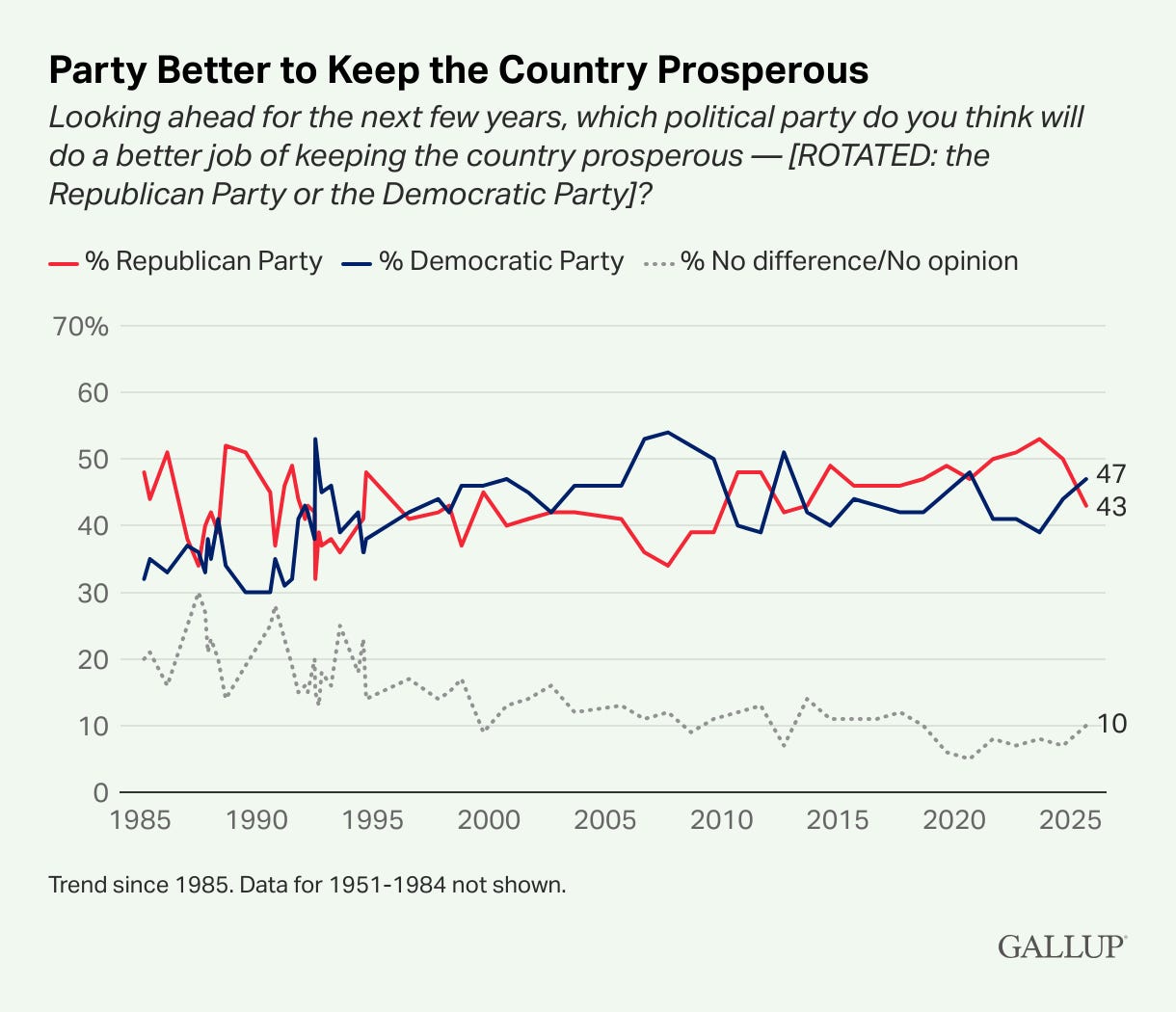
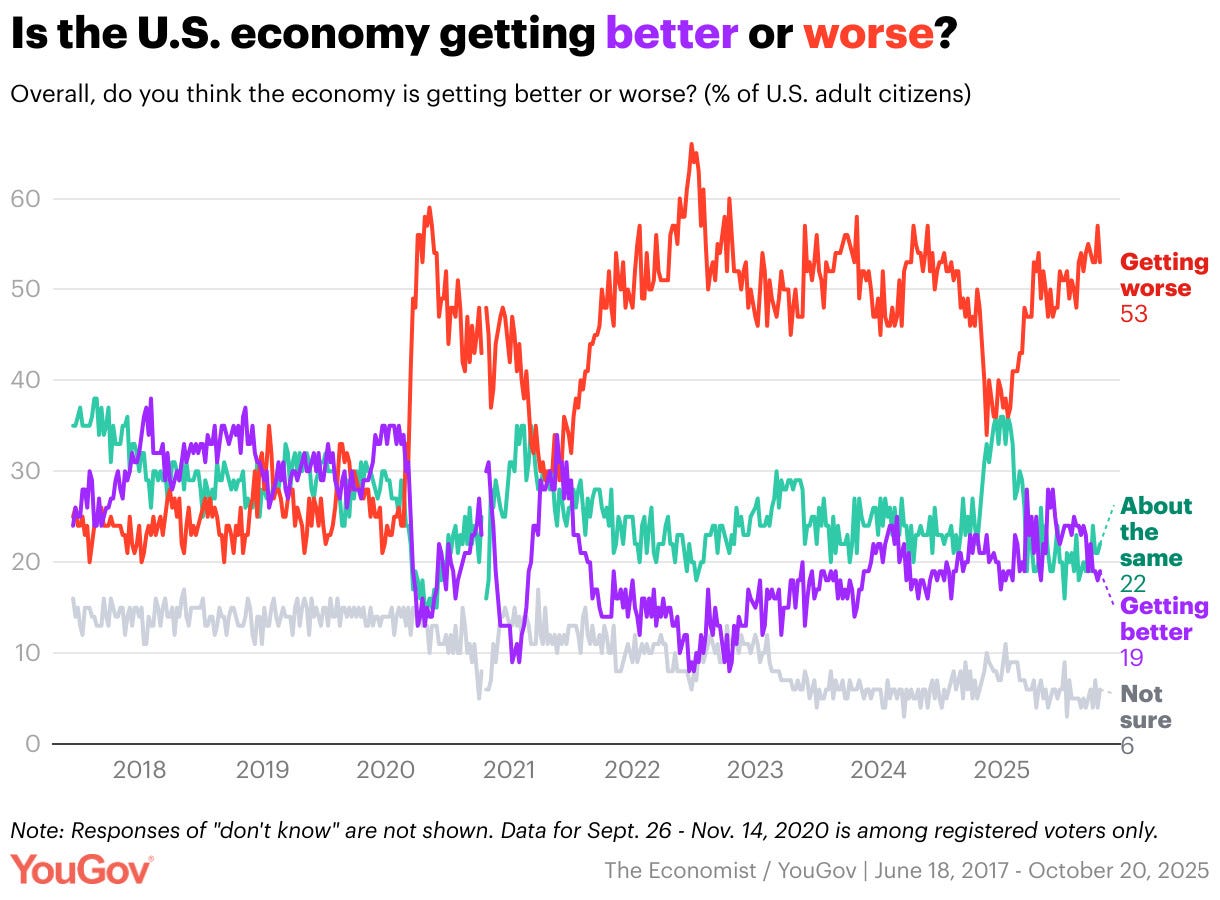
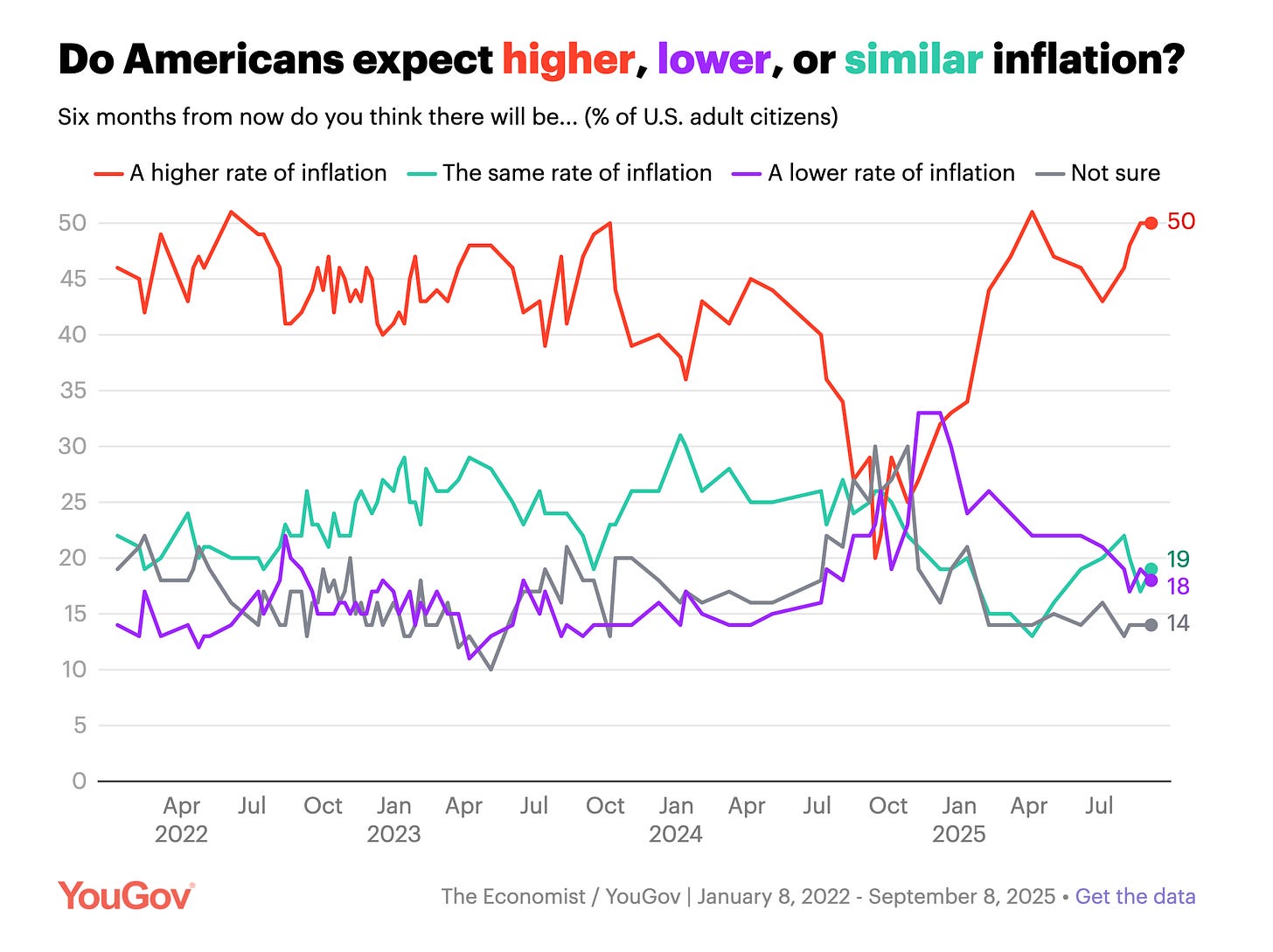
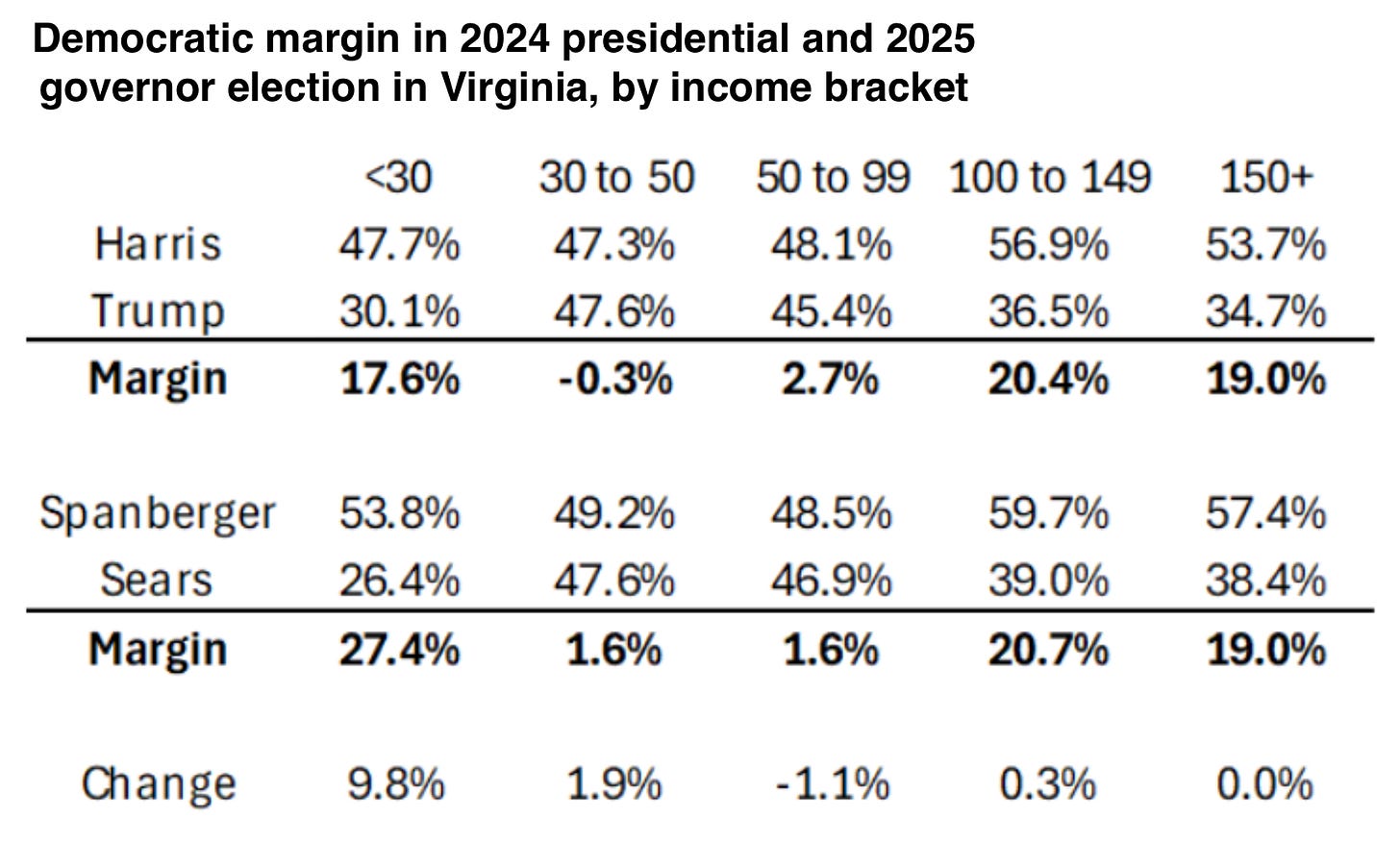
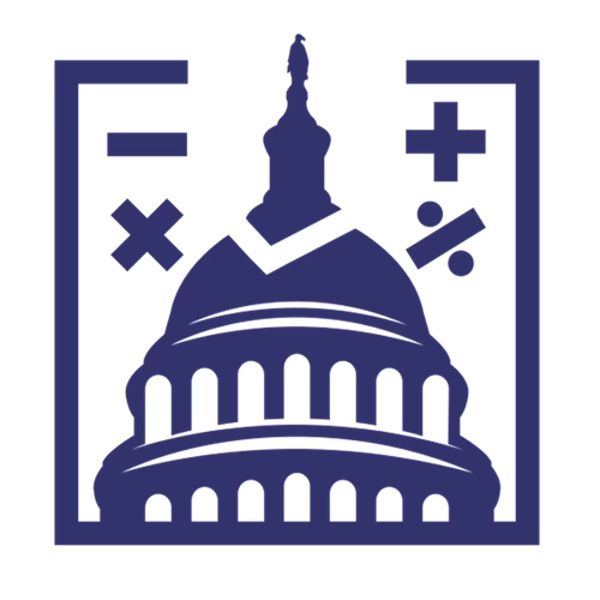
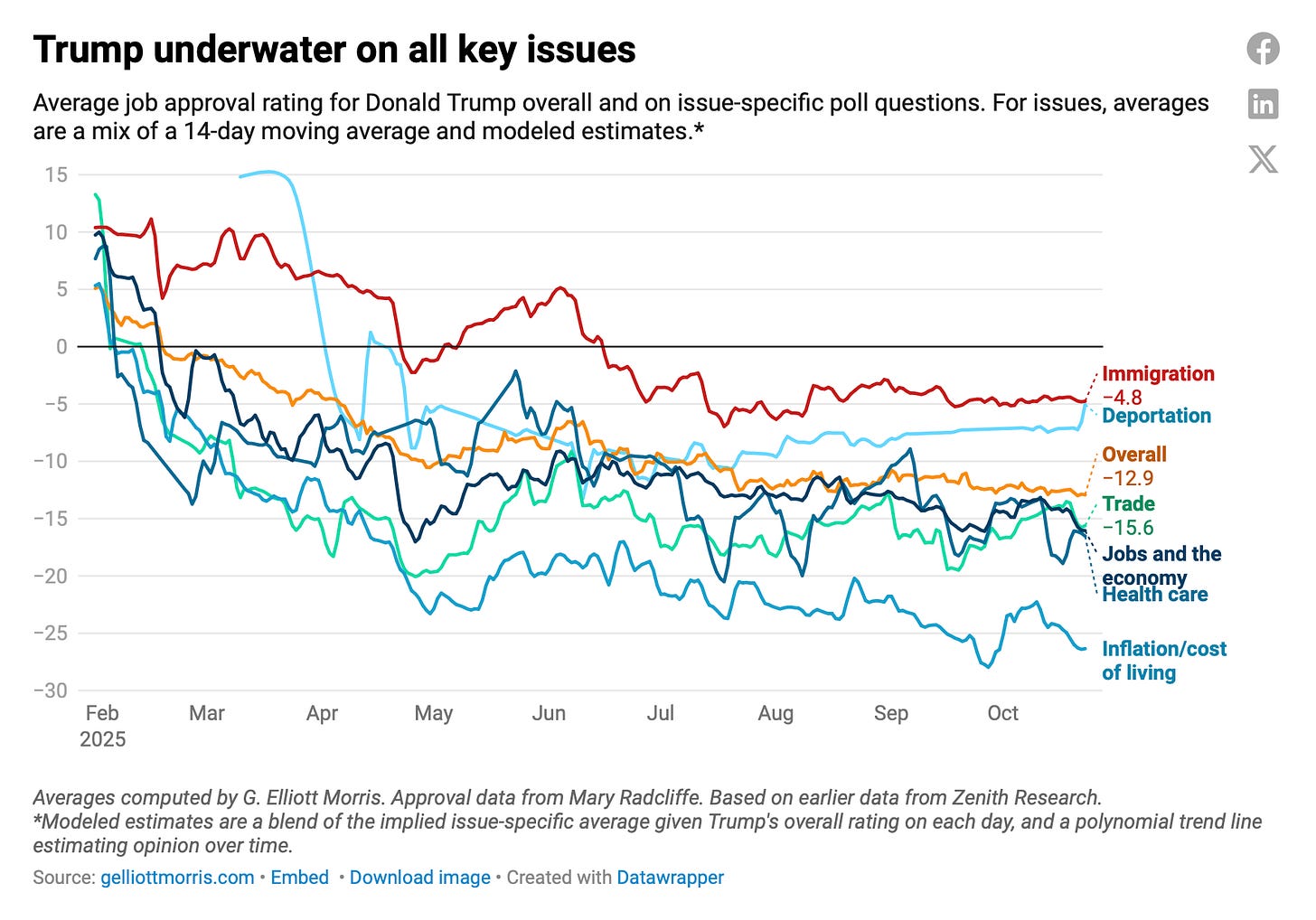
Not the point of this piece but I found this sentence the most striking:
"First, because no politician in America is elected by national popular vote."
Speaks to the larger issue of how well our politicians reflect "the will of the people".
As a nation (and states) we need big changes to better align our politicians with our people.
I hope (but highly doubt) that this administration will teach both pundits and voters something that they generally do not believe.
Trump is proving that the federal government has huge potential to make any economy worse very rapidly, while Biden proved that there is little it can do to fix it quickly.